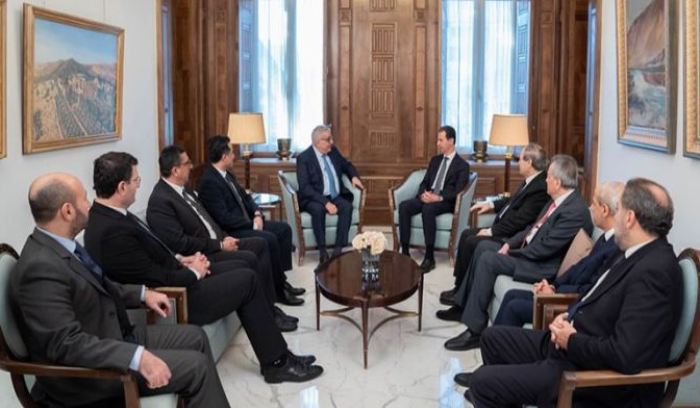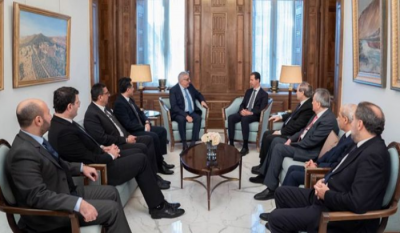The official visit of a Lebanese ministerial delegation to Syria has sparked criticism among a faction opposed to the Syrian regime, which views it as an unjustifiable step toward "normalization" with the Syrian government. They believe that aid could have been sent to Syria without a political meeting with the regime's representatives. Meanwhile, the faction supporting the Syrian regime described the visit as a "duty" toward Syria and its people following the disaster caused by the earthquake.
In response to the question of whether the earthquake could lead to a normalization of relations on multiple fronts, a Syrian political source told "Al-Jumhuriya" that caretaker Prime Minister Najib Mikati would not take such a step under the current circumstances. However, the political reality in Lebanon is no longer what it was during the Syrian war, and such a step is likely to happen soon. The ministerial delegation's visit has reportedly smoothed relations and set the stage for potential developments, which Damascus prefers to happen through a fully established Lebanese authority rather than during a vacancy in the presidential position.
For its part, "Al-Liwa" observed that President Bashar al-Assad's meeting with the Lebanese ministerial delegation has opened the door to putting the issue of the return of Syrian refugees to their homeland on the table, as soon as the emergency circumstances affecting the Syrian and Turkish people, along with individuals from various nationalities, including Lebanese who died under the rubble of the devastating earthquake that struck wide adjoining areas in Turkey and Syria, become clearer.
According to a well-informed Lebanese source, although the visit had a brotherly humanitarian aspect, discussions with Assad and Foreign Minister Faisal Miqdad transcended mere humanitarian aid, but did not fully open the door to "political normalization."
Meanwhile, "Al-Akhbar" noted that the Lebanese ministerial delegation returned yesterday evening from Syria, a country that has issues with all its neighbors, carrying President Bashar al-Assad's assessments of the first official visit after a long estrangement, calling for building on it to develop bilateral relations between the two countries.
At the Syrian border, former Syrian ambassador to Lebanon Ali Abdul Karim Ali, representing Foreign Minister Faisal Miqdad, warmly welcomed the Lebanese delegation, headed by Foreign Minister Abdullah Bou Habib, accompanied by ministers of agriculture, public works, transport, and social affairs: Abbas al-Haj Hassan, Ali Hamieh, and Hektor Hajjar, as well as the Secretary General of the Ministry of Foreign Affairs Hani Shmeitli, the Director of Arab Affairs at the Foreign Ministry Ali Al-Mawla, and the General Director of the Ministry of Health Fadi Sinan, and Chairman of the Higher Relief Committee Mohammad Khair.
The first stop was at the Ministry of Foreign Affairs, where Bou Habib conveyed Lebanon's solidarity with the Syrian people during this ordeal, highlighting Syria's support for Lebanon during its critical times. Al-Haj Hassan conveyed condolences from Speaker of Parliament Nabih Berri, and Hajjar did the same on behalf of former President Michel Aoun.
The countries in the region understand that the U.S. has no allies or friends, which makes us appreciate the circumstances of everyone. Following this, the delegation visited the Migrants' Palace, a stop that is significant for its political implications. Assad warmly welcomed each guest individually, marking the first high-level visit since the rupture that followed the outbreak of war in Syria. The atmosphere of the meeting indicated that Assad conveyed confidence in the ability to overcome the challenges faced by his country. He appreciated Lebanon's measures and outlined the magnitude of the disaster caused by the earthquake, reviewing the initiatives from many Arab countries to provide assistance, emphasizing the importance of this aid regardless of the circumstances, stating, “Especially since we know that many countries are under American pressure.” He added, “Countries in the region realize that the U.S. has no allies or friends, and therefore we appreciate everyone’s circumstances.”
Hamieh elaborated on Lebanon's efforts to receive aid in its air and land facilities, exempting it from customs and transit fees, as well as exempting the Foreign Ministry from visa requirements for those arriving in Syria via Lebanon, aimed at countering airlines and maritime shipping companies' reluctance to come to Syria due to insurance coverage refusals. The new development was that Lebanon sent heavy machinery used by contractors in the private sector, equipped with large cranes to remove rubble. Assad responded, “Your aid has tangible effects on the ground and leaves a moral impact on the Syrian people.”
Later, the Syrian Foreign Minister hosted a lunch in honor of the Lebanese delegation, attended by the Syrian Minister of Agriculture and several ambassadors.




